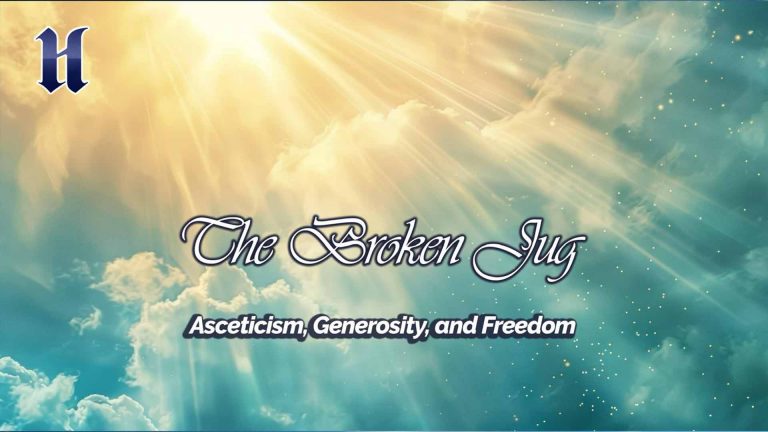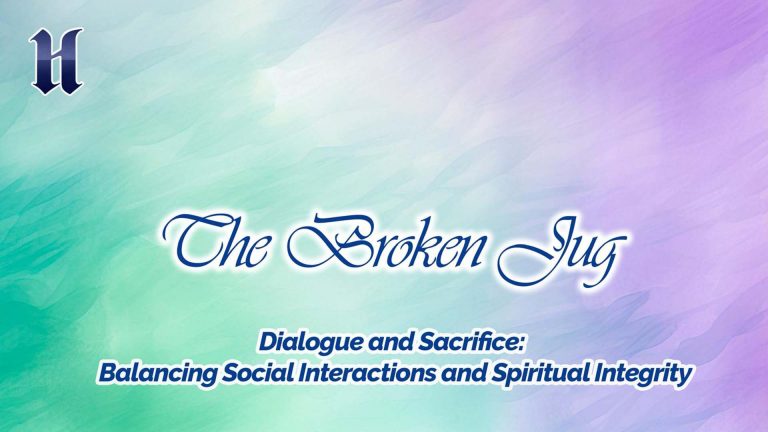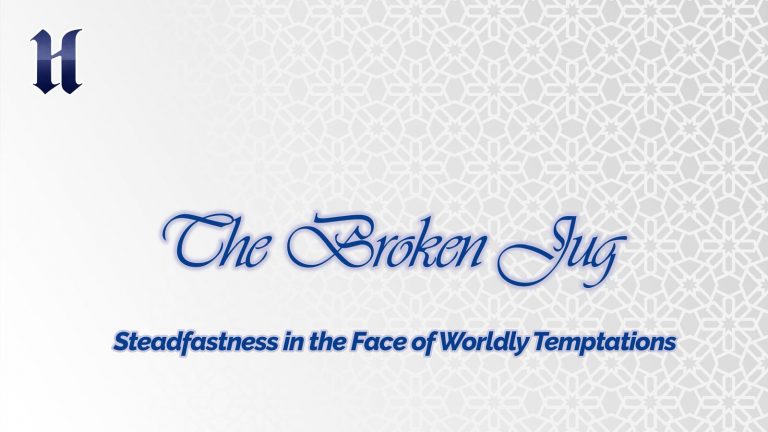Question: Could you elucidate the lessons we can take from the verse, meaning: “O Our Lord! Do not make us prey to those who disbelieve. And forgive us, our Lord. You are the All-Glorious with irresistible might, the All-Wise” (al-Mumtahina 60:5).
Answer: Prophet Abraham’s name is openly mentioned in the previous verse and we understand that this prayer belongs to him. In the previous verse, God Almighty states the following about Prophet Abraham and the believers in his company: “Indeed, you have had an excellent example to follow in Abraham and those in his company.”
It is not possible to understand the true depth and immensity of the Qur’an by means of simple translations with a superficial approach. For this reason, let us expound on the matter further and try to reflect the meaning of the verse in our mirror of comprehension by paraphrasing it: “You can find all of the ideal examples you seek in the perfect lives of Prophet Abraham and those in his company, with respect to their words, states, attitudes, and behaviors. This is because they were virtually embodiment of ideal examples.” God Almighty brought this prayer to our attention as one of the exemplary behaviors from Prophet Abraham’s noble life.
A Word of Extensive Meaning: Fitnah
Understanding the prayer of Prophet Abraham depends, to some extent, on understanding the word “fitnah” well. For this reason, it is first necessary to elaborate on the word “fitnah” a bit.
Arabs refer to the act of refining gold from dust and stones as fitnah. In a general sense, it means a trial, a test, putting something to a melting pot, or separating something from undesired elements.[1] In connection to this essential meaning, the word fitnah has an extensive field of figurative use in religious literature. For example, though causing tumult, mayhem, turmoil, and strife between people is referred as fitnah, others kinds of worldly trials—such as greed, health, youth, and worldly ambition—which may cause a person to lose their eternal bliss are also fitnah. In addition, when believers are subjected to oppression, tortures, and persecution; or if they are forced in different ways to contradict their faith, to renounce parts of their faith, or are sent to exile because of their faith; all these are examples of fitnah. What fitnah mentioned in the verse means is the sense expressed within the frame of this latter description.
The word “imtihan” (trial) is sometimes used interchangeably with the word fitnah and is also significant in terms of understanding the notion of fitnah. As it is known, “imtihan” comes from “mihnat,” a word used for referring to the process of purifying silver by melting it in fire.[2]
Accordingly, people who volunteer for shouldering a lofty ideal will be subjected to various ordeals and trials. Those who wage war against religion, virtue, and morality will not let such believers live in accordance with their values, but will coerce them to step back from the path they believe and lead a life similar to theirs. Prophet Abraham and those in his company were also subjected to persecution and torment due to their sincerity and resolute stance; they were driven away from their hometown, and underwent heavy pressures, just like being thrown into fire. In the face of all these trials, Prophet Abraham opened his hands as a requirement of his duty of guidance; and together with the believers near him, he prayed for deliverance from oppression with the following words:
“O Our Lord! Do not make us a prey to those who disbelieve (do not let us become objects in their hands that are put to fire, then battered, then placed on an anvil, and then banged with hammers!). And forgive us, our Lord! You are the sole owner of victory and wisdom.”
The inherent impotence and weakness in human nature is voiced through this prayer, for the trial is truly hard. A person may not resist being battered with hammers and remaining in fire. In this respect, using his great insight, Prophet Abraham sought refuge in God against such a calamity.
Requisites of the Righteous Path
As a matter of fact, troubles, misfortunes, fitnahs, and trials are the unchanging fate for those who take the righteous path. A person becomes a target to enemies of faith, according to his or her degree of soundness and earnestness before God. If you have become a person of integrity with your faith, and care for your cause and the ideal state you present, this will make adversaries anxious, and they never leave you alone.
When they asked the noble Prophet, “O Messenger of God, which people are subjected to the hardest of troubles?” he answered, “The Prophets, and then other people in accordance with their level.”[3] As it is explicitly understood from this hadith, the severest, hardest, and most insurmountable troubles befall the Prophets. Other believers are then exposed to troubles according to their level. In this respect, we can say that if we had been subjected to the same trials the Prophets underwent, we would not be able to bear them.
Discerning the Meaning of Trials Correctly
Right after his wish for deliverance from fitnah, Prophet Abraham asked forgiveness from God. Although a believer becomes a target solely for being on the righteous path, and thus undergoes troubles and fitnahs, he still considers the possibility of these stemming from his own faults and sins, and thus asks, or should ask, forgiveness for these sins.
A person should approach every trouble and misfortune that befalls him with the approach of Umar ibn al-Khattab. As it is known, he ascribed the drought that took place in his time to his own sins, put his head on the ground in prostration, and said, “My God! Please do not ruin Muslims because of my sins!”
This is the attitude of an ideal believer. If lightning strikes or a flood takes place, such a person should say, “I wonder whether it happened on account of my sins?” A believer should ascribe all troubles and misfortunes to his sins – and should also think that they serve as a means of purification from these sins.
On the other hand, if believers associate partners with God by means of laying personal claim on certain bestowals of God and ascribing certain good outcomes to themselves, this may also cause certain misfortunes to befall them. God Almighty never wants us to associate partners with Him. There is no graver sin or ugly deed comparable to such an adulteration of deeds fulfilled for the sake of one God.
Associating partners with God does not only mean worshiping stone or wooden idols. This is the plain version. There is also the hidden version of associating partners with God. With reference to this subject the Messenger of God stated, “What I fear about you most is associating partners with God in the minor sense (shirk al-asghar).” When the Companions asked the meaning of this minor sense, he answered that it is “riya” (showing off and affectation).[4]
Such a form of associating partners with God is explained in another hadith as follows: “Associating partners with God is more covert than an ant walking on a rock on a dark night.”[5] Affectation is so sinister and covert that a person does not realize it most of the time, and thus his devotions and services on the path of God waste away.
When people striving on the path of God adulterate their works by associating partners with God, He might occasionally let misguided ones pester them, as an imposed blessing. When we look at the Risale-i Nur Collection, we see that Bediüzzaman relates many examples of this, such as those in “Slaps of Divine Compassion” and the “Supplements.” In addition, it needs to be known that troubles that befall believers are directly proportional with the gravity of the sins. According to the scope of one’s faults and sins, the misfortunes can be slaps of compassion, or chastisement.
Divine Destiny Rules Justly
While adulterating good works with egocentric considerations—e.g., acts like self-congratulation about an article one has written, or expecting appreciation for a building one has constructed—might lead to receiving a “slap of compassion,” it might even nullify a great deal of labor, effort, sweat, and pain. In addition, God may subject believers to fitnah as a consequence of all these and discipline them by means of unbelievers. Although misguided ones commit oppression, Divine destiny rules justly. Undergoing such a trouble is expiation for sins. However, it needs to be known that there are certain conditions for such fitnah and trials can become atonement for sins.
If believers realize the fact that the troubles they undergo stem from their own wrongs, turn to God in genuine repentance, and ask forgiveness from Him by saying, “I truly repent O Lord! I ask forgiveness a million times,” the fitnah that befell them may turn beneficial and become a means for their forgiveness.
Bediüzzaman also expressed that he understood the reason for the ordeal he was subjected to through the hands of misguided and worldly ones, and made the self critical interpretation that it happened because he made serving on the path of faith and the Qur’an a tool for his personal progress for this world and the next.[6] There is not the slightest indication about abuse. But this is how he evaluated the issue from his horizons of self-criticism. A person should not cherish any worldly or otherworldly expectations in return for the services he carries out for the sake of God. One must not only be free from expectations of appreciation and applause, but even from otherworldly expectations as, “Let me carry out these works, so that I make progress on my spiritual journey; let me ascend one more step; let me enter Paradise and enjoy its highest level of Firdaws…”
Otherwise the troubles, hardships, and pains taken may not be expiation for sins. For example, if a person who undergoes a fitnah says, “I am striving on the path of God. I did not do anything wrong to deserve this,” and does not make any self-criticism—or even if he complains about his condition, then he will have gone through much in vain. In addition, such a person—May God protect us—will have committed the sin of criticizing Divine Destiny and not resigning to God’s decree.
May God enable all of us to serve us on His path until our last breath, to bless our life with the light of consciousness of repentance and asking forgiveness, and thus walk to the realms beyond in a purified and immaculate state!
[1] Ibn Manzur, Lisanu’l Arab, 13/317.
[2] Az-Zabidi, Taju’l-Arus, 36/153.
[3] Sunan at-Tirmidhi, Zuhd, 57; Sunan Ibn Majah, Fitan, 23
[4] Ahmad ibn Hanbal, Al-Musnad, 5/428, 429; Tabarani, Al-Mujamu’l-Kabir, 4/253.
[5] Ahmad ibn Hanbal, Al-Musnad, 4/403; Ibn Abi Shayba, Al-Musannaf, 6, 70.
[6] Nursi, Bediüzzaman Said, Emirdağ Lahikası (Supplements of Emirdağ), İstanbul: Şahdamar, 2010.
This text is the translation of “Fitne Ateşi ve Dua.”






